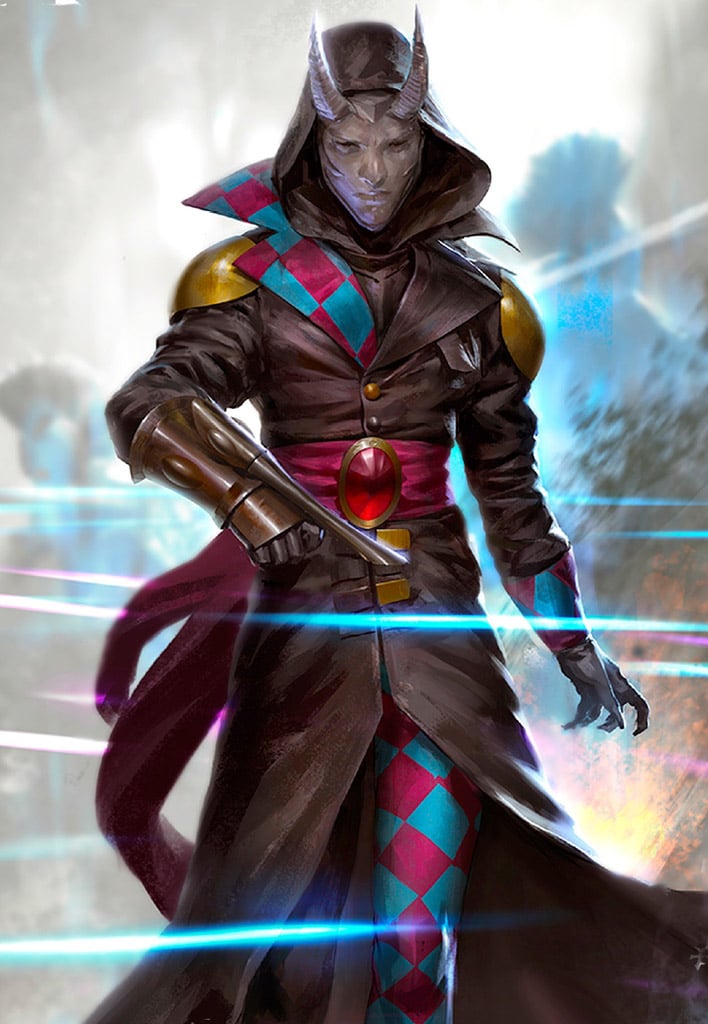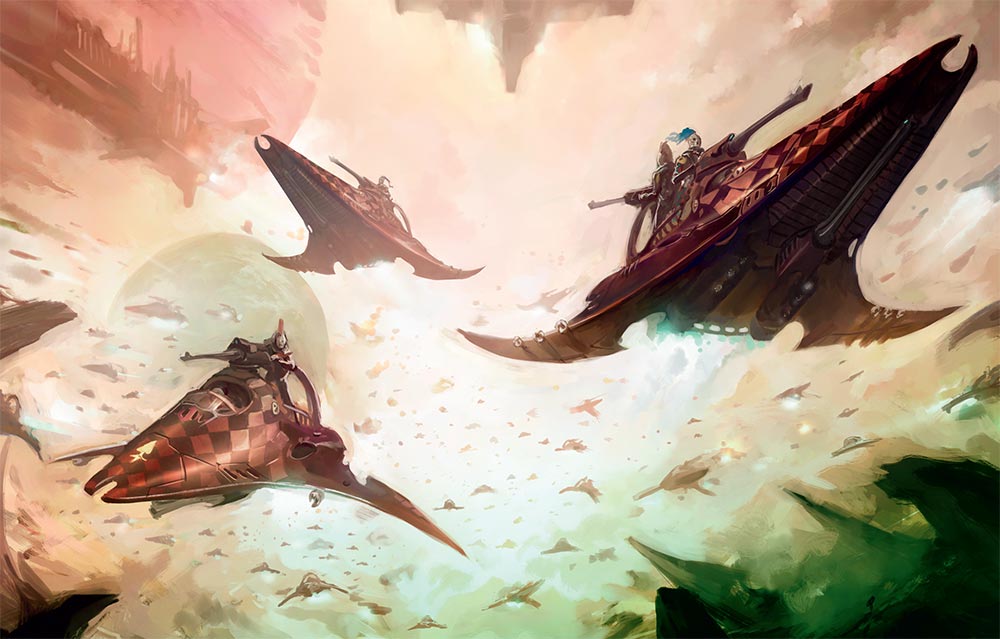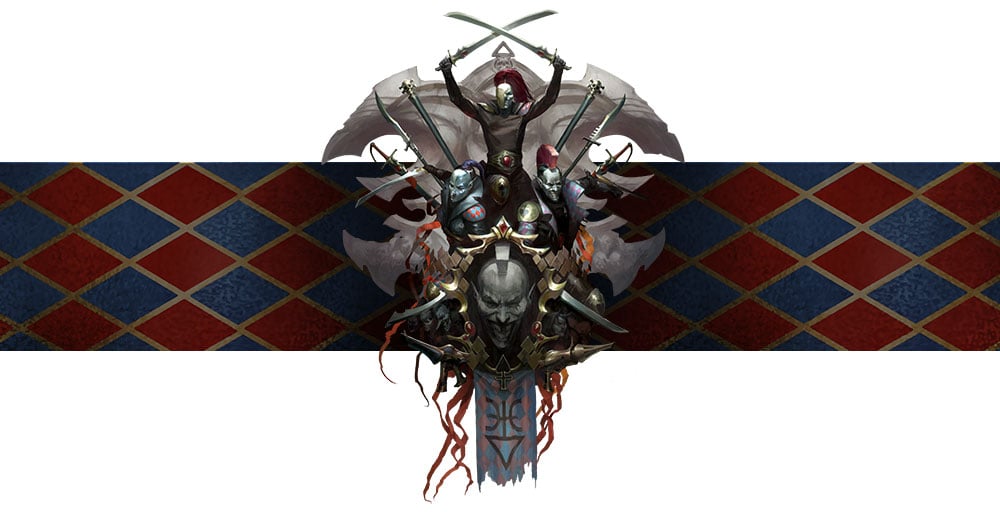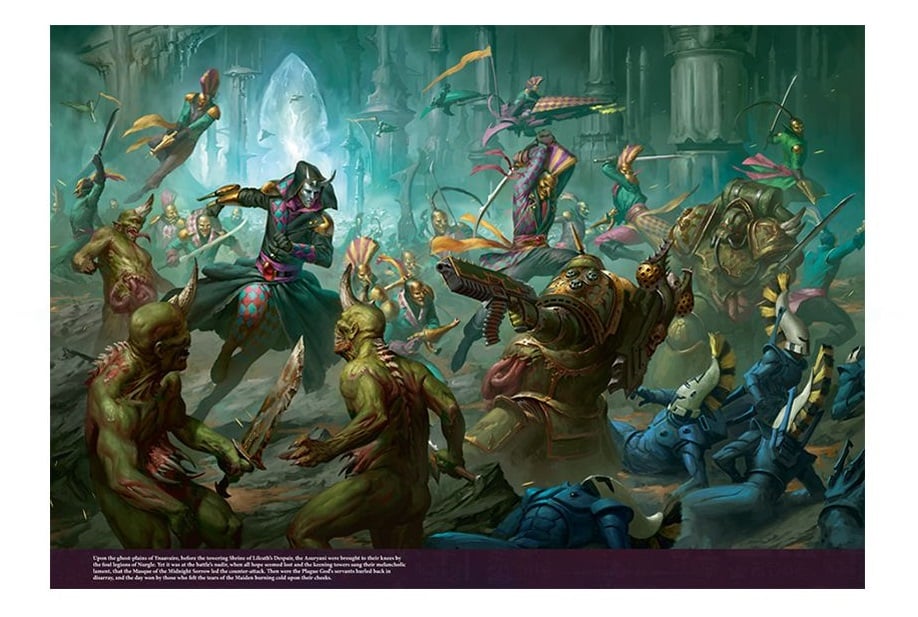Warhammer 40K Loremasters: The Harlequins
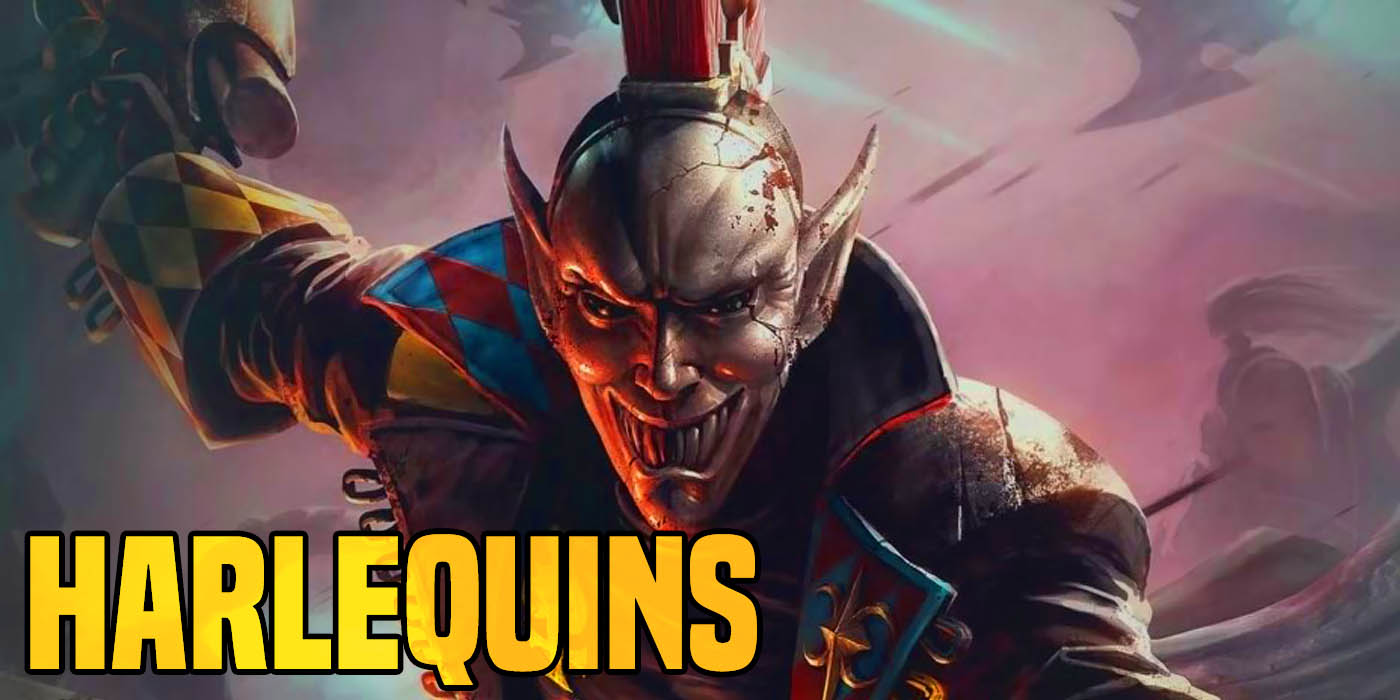
Come Loremasters and learn of the most exotic and deadly of the foul xenos Eldar – the Harlequin dancers of the Webway.
The Harlequins, or Rillietann, are a unique subset of the Eldar race, who split their time between being talented battlefield fighters and theatrical performers. They exist outside of normal Eldar society and hold no allegiance to any Craftworld, Kabal, or other form of authority other than to their own belief in the Eldar deity Cegorach, the Laughing God.
History
Harlequins date back to the ancient Eldar Empire. They first appeared amid the hedonistic debauchery of the pre-Fall Eldar to perform their ancient mythic dances. These acts sought to remind their people of all that they were throwing away. However, many amongst their audiences reacted with hostility, forcing these early Harlequins to become proficient in combat.
During the Fall of the Eldar, the Laughing God Cegorach managed to escape destruction at the hands of Slaanesh. The followers of Cegorach were hidden safely away within the Webway and survived the disaster intact. Yet immediately after the Fall, the Harlequins vanished into the Webway to prepare for a war that would consume their future utterly. After centuries of isolation, the Harlequins made their spectacular return in M33 when the Masque of the Midnight Sorrow burst from the Webway upon the world of Llayen Nuadh to drive back a horde of Slaaneshi Daemons, rescuing Ulthwe forces in the process.
Harlequins carry out several self-appointed duties since their first reappearance after the Fall, the most central of which is putting on theatrical performances of Eldar History. Most notable among their performances is the epic Fall of the Eldar. Their belief system is intertwined with the Fall, as Cegorach is one of the few Eldar deities reckoned to have survived it in some way. The Harlequins believe that his intrinsic light-hearted personality ensured he kept his distance from the depravity and corruption that became Slaanesh and that he survives to this day, often taking the form of a Harlequin himself – with those that meet him in this guise only becoming aware of his presence after he has left.
As the Eldar are a scattered race, Harlequins constantly tour the domains of their species (as well as other places; Harlequins believe other species should be told the stories of the Eldar as well) in their duty to perform. The dual-aspect of their nature serves them well when abroad in the galaxy, as Harlequins are reckoned to be the deadliest combatants of all the Eldar. Their acrobatic and deceptive skills, as well as their unique weapons and equipment, render them such mystifying and terrifying enemies that some of the less-developed races of the galaxy have incorporated them into their mythology as magical spirits or eldritch monsters.
The Harlequins are rumored to be among the few who know the location of the legendary Black Library and help protect it against unwanted intruders. As the 41st Millennium comes to a close, more and more Eldar vanish into the Webway, forsaking their past lives and taking up a Harlequin mask.
Recruitment
No Eldar is born a Harlequin, all of their number are recruited among greater Eldar society, be they Craftworlder, Dark Eldar, or Exodite. Some are supposedly drawn from amid bustling crowds, beckoned into the shadows by a masked figure only they can see. Others simply vanish from their personal chambers. Others are swept up in a Harlequin performance and stolen away, lose a wager with a Troupe Master, or follow mysterious laughter into a Webway Gate. Every Eldar culture has strange and cautionary tales regarding the Harlequins as a result.
Whatever the means of becoming a Harlequin, to become one means erasing all that has come before including friends, family, and purpose. However it happens, once an Eldar becomes a Harlequin, every aspect of their old identity is erased. Each joins a Light, Twilight, or Dark Troupe and assumes a new role at the direction of their Troupe Master. These roles – each known by a ritual character name such as the Sun Prince or Shaimesh the Poisoner or Webway Witch – inform every facet of the Harlequin’s new personality. Just as the Eldar on the Craftworlds funnel every aspect of their psyche into a single Path, so the Harlequins turn their minds absolutely to playing their allotted role. Known as the Theyldh, this process of becoming their “true” self is far more intense than anything experienced by any other performer in the galaxy.
Organization
The overall leaders of the Harlequins are known as the Great Harlequins. Harlequins organise themselves into two standard units, the troupe and the masque. A troupe is a number of ‘ordinary’ Harlequins (referred to as troupers) led by a Harlequin Avatar. A masque is simply one or more troupes that are accompanied by specialist performers. In each Masque, each Harlequin belongs to one of three Troupe Divisions, the Light (headstrong, aggressive, and heroic), the Dark (vindictive and flamboyant), and the Twilight (obsessively precise and detailed). Harlequin masques function with brutal efficiency, able to operate with extreme cohesion and coordination despite lacking a formal military chain of command and having little direction upon the battlefield.
Each of the Masque’s mythic plays has a battlefield counterpart, known as the Saedath. Essentially a strategic battle plan with an allegorical aspect, these inform target priority, overall strategy, and by which troupe division the conflict will be led. The appropriate Saedath is chosen based upon mythic cycles, ritual significance, or even the time of day. The most famous Saedath is Cegorach’s Revenge, the military counterpart of the Fall of the Eldar that values high-speed sorrow-driven slaughter over subtlety or cunning. Other Saedath’s are the Serpent’s Blood (which is performed entirely by airborne Masques), the Hundred Swords of Vaul, the Torments of the Fiery Pit, Heroes Path (which sees a Death Jester and Shadowseer play the roles of Ulthanash and Eldanesh and a Solitaire embodying their pride), Faolchu’s Blade (which sees a formation of Skyweavers and Voidweavers scream down upon the enemy to embody the Great Hawk’s consort as she bore the sword of Anaris to Eldanesh‘s hand), Cegorach’s Jest(which sees Voidreakers and Skyweavers blasting a path to a “prize” to evoke the Laughing God’s efforts to humble Kurnous), and Isha‘s Weeping.
Equipment
Harlequins posses several distinctive pieces of costuming/equipment, most notably their Agaith; false-faces. These masks come with various Eldar forms of auto-senses and respirators, and, with the exception of the blank Shadowseer masks, are highly ornamented. Avatars typically possess a more advanced version equipped with holo-generators that allows it to not only adopt numerous styles, but record and replay whatever the Harlequin has seen. This is normally used to replay the death-agonies of enemies… to other enemies. These morale-breaking devices are called marathags (“Face of Death”).
Even compared to other Eldar, Harlequins are graceful and lithe; they augment this natural prowess with so-called ‘flip-belts’ that generate a small anti-gravitic field around them and allow them to leap unnaturally high. They also wear holo-suits; sophisticated substitutes for armour that also aid theatrical performance. When set to battle-conditions, whenever the Harlequin moves, their image is shattered into a cloud of crystal shards that dance and swirl around with vigour proportional to the speed the Harlequin is moving.
Harlequins are also noted for their exotic and deadly combat weapons. The most gruesome of these is the Harlequin’s Kiss, which resembles a sharpened tube, tapering to a wicked point, fixed to a warrior’s forearm. The tube is actually filled with monofilament wires. When the Kiss is punched into a victim, the wires uncoil and flail around, slicing the victim apart from the inside
Learn More of Cegorach – The Laughing God of the Harlequins
Lexicanum
“Harden your soul against decadence. But do not despise it, for the soft appearance of the decadent may be deceptive. One need only consider the Harlequin dancers of the Eldar to see the truth of this proposition.” ~Leman Russ


